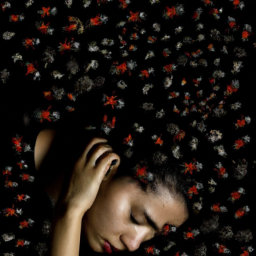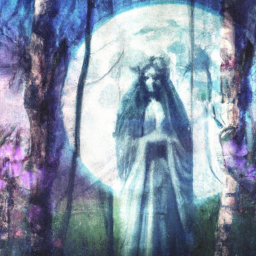I often find myself dreaming about my late grandmother. In these dreams, she appears healthy and happy, and we have a great time together, just like we did when she was alive. I was initially confused by why I kept dreaming of her, but after researching, I discovered that dreaming about deceased loved ones is a common experience.
Many people believe that seeing dead relatives in dreams is a way of processing grief. Dreams can provide a safe space to explore and work through emotions that may be difficult to confront in waking life. Additionally, some people believe that these dreams are a form of spirit communication, allowing loved ones who have passed away to reach out and connect with us from beyond the physical world.
In this article, we’ll explore some of the different theories and beliefs surrounding why we see dead relatives in our dreams, as well as some coping strategies for those who may be struggling with these experiences.
Key Takeaways
- Dreaming about dead relatives is a common way for our brains to process grief and emotions related to loss.
- Seeing a deceased relative in a dream could represent a need for closure or forgiveness, rather than actual communication from the spiritual realm.
- Recurring dreams about dead relatives may indicate unresolved emotions or unfinished business.
- Seeking support from loved ones, therapist, or support group can provide valuable insights and coping strategies for understanding and processing dreams.
Top picks for "dead relativ dream"
Open Amazon search results for this keyword.
As an affiliate, we earn on qualifying purchases.
The Commonality of Seeing Dead Relatives in Dreams
You’ve probably had a dream where you see a deceased relative and wake up feeling like they were really there, right? You may even feel like the dream was more than just a dream and that it was a message or a visit from them.
This is a common experience for many people and can be both comforting and unsettling. Seeing dead relatives in dreams is a way for our brains to process grief and emotions related to loss. It’s a natural part of the grieving process and can help us come to terms with our feelings.
However, it’s important to remember that dreams are not always literal and should not be taken as a sign that our loved ones are trying to communicate with us from beyond. Instead, it’s a way for us to work through our own emotions and memories.
Grief Processing
As I process the grief of losing my loved ones, I often find myself dreaming about them. In these dreams, they appear healthy and happy, as if they never left. It’s like my mind is trying to make sense of their absence by conjuring up their presence. But these dreams can also be emotionally challenging, as they bring up unresolved feelings and unfinished business.
According to the Kubler-Ross model of grief, there are five stages of grief: denial, anger, bargaining, depression, and acceptance. Dreaming about our deceased loved ones can be a way of working through these stages, especially if we haven’t fully accepted their death. By seeing them again in our dreams, we may be able to say the things we never got to say, or find closure in some other way.
| Grief Processing |
|---|
| Grief is a natural response to loss. |
| Dreams can help us process grief by bringing up unresolved feelings and providing closure. |
| The Kubler-Ross model of grief describes five stages: denial, anger, bargaining, depression, and acceptance. |
As we move through the grief process, some of us may experience what is commonly known as spirit communication.
Spirit Communication
Imagine feeling a comforting presence around you, hearing whispers, or seeing signs from a loved one who’s passed away; this is what some people refer to as spirit communication. It may seem surreal, but it’s believed to be a way for the deceased to let their loved ones know that they’re still around and watching over them.
Here are some possible explanations for why you may see dead relatives in your dreams:
-
Unresolved emotions: Dreams are a way for our subconscious mind to process unresolved emotions. If you’re still grieving the loss of a loved one, you may dream of them as a way to cope with your grief.
-
Spiritual connection: Some people believe that dreams are a form of spiritual communication. Your deceased loved one may be trying to communicate with you to provide comfort and guidance.
-
Symbolic representation: Dreams often use symbolism to convey a message. Seeing a deceased relative in a dream could represent something else entirely, such as a need for closure or forgiveness.
-
Random occurrence: It’s also possible that dreaming of a deceased relative is simply a random occurrence with no deeper meaning.
While spirit communication may offer comfort to some, it’s important to remember that it’s ultimately up to individual interpretation. In the next section, we’ll explore cultural beliefs and traditions surrounding dreams about deceased loved ones.
Cultural Beliefs and Traditions
In many cultures, dreams about deceased loved ones are believed to hold significant meaning and are often seen as a form of communication from the spiritual realm. For example, in some Native American cultures, it’s believed that dreams are a way for spirits to communicate with the living.
These dreams are seen as a blessing and a sign that the spirit of the deceased loved ones is still with us. Similarly, in some Asian cultures, it’s believed that dreams about deceased loved ones are a way for them to offer guidance and advice to the living.
These dreams are seen as a way for the deceased loved ones to provide comfort and support to the living, especially during times of difficulty. However, while cultural beliefs and traditions can offer some explanation for why we see dead relatives in our dreams, scientific theories also offer some insight into this phenomenon.
Scientific Theories
You might be interested to know that scientific theories provide insight into why we may have experiences of deceased loved ones in our dreams. One theory is that our dreams serve as a way for us to process emotions and memories, including those related to the loss of a loved one. Our brains may be attempting to make sense of the grief and sadness we feel by creating a scenario where we can interact with our deceased loved one in a safe and comforting environment.
Another theory suggests that these dreams are a product of our own memories and imagination. Our brains may be using past experiences and knowledge of our loved ones to create a dream that feels real and personal. This can be especially true if we have a strong emotional connection to the person we are dreaming about.
| Column 1 | Column 2 |
|---|---|
| Memories | Nostalgia |
| Sadness | Grief |
| Comfort | Love |
| Longing | Connection |
| Hope | Peace |
As we move into the next section about recurring dreams, it’s important to note that these dreams can also involve deceased loved ones. Recurring dreams can be particularly meaningful and may indicate unresolved emotions or unfinished business with the person we are dreaming about.
Recurring Dreams
I’ve always been fascinated by recurring dreams. It’s intriguing to me how our minds can create a pattern and repeat it over and over again.
In my experience, these dreams often leave me with a feeling of unease. I find myself seeking closure to understand their meaning.
Understanding Patterns
Surprisingly, recognizing patterns in your dreams could reveal potential reasons for why deceased relatives appear in them. Here are some possible patterns to look for:
- Time of year: Do you tend to dream about your deceased relatives around certain holidays, anniversaries, or other significant dates?
- Location: Do your dreams take place in a specific location, such as your childhood home or a place that was significant to your deceased relative?
- Emotions: Are there specific emotions that tend to accompany these dreams, such as sadness, happiness, or nostalgia?
- Interactions: Do you always have the same kind of interaction with your deceased relative in your dreams, such as just seeing them or having a conversation with them?
Recognizing these patterns may help you understand why your deceased relatives appear in your dreams and give you some insight into what you may need in order to find closure.
Perhaps seeking closure is the next step in order to come to terms with the loss of a loved one.
Seeking Closure
Recognizing patterns in dream experiences may provide me with insight into ways to seek closure after losing a loved one.
In my case, seeing my deceased relatives in my dreams is a recurring pattern that I’ve noticed. For a while, it was a source of comfort, but as time passed, I began to feel uneasy about it.
I realized that I wasn’t processing my grief properly and that I needed to find a way to confront my feelings. Seeking closure is a necessary step in the healing process after losing a loved one.
For me, this means exploring different ways to process my grief, such as seeking support from friends and family, attending therapy, and journaling.
Additionally, I’m interested in exploring lucid dreaming as a tool to help me confront my emotions.
Lucid Dreaming
Lucid dreaming allows me to control my dreams and explore different worlds. It’s an incredible experience that lets me fully immerse myself in my subconscious mind.
When I become aware that I’m dreaming, I can start to manipulate the dream in any way I want. I can fly, talk to animals, or even visit my deceased loved ones.
However, even though I can control my dreams, I still see my dead relatives in them. I believe that dreams are a reflection of our subconscious thoughts and emotions, and seeing my loved ones in my dreams is a manifestation of my desire for closure. It’s a way for my mind to process and come to terms with their passing.
But dreams are more than just a reflection of our thoughts and emotions. They can also be metaphors for the challenges and experiences we face in our waking lives, and that’s what we’ll explore in the next section.
Dreams as Metaphors
Dreams can serve as powerful metaphors for the challenges and experiences we face in our waking lives, providing insight and understanding into our subconscious thoughts and emotions. Sometimes, our dreams can be interpreted as a way for our minds to process and make sense of the events and emotions we experience in our daily lives.
For example, dreaming about being lost in a maze could represent feeling lost and unsure about our path in life. Similarly, dreaming about falling could represent a fear of failure or feeling like we’re losing control.
It’s important to pay attention to the metaphors and symbols in our dreams in order to gain a deeper understanding of ourselves and our emotions. By doing so, we can better equip ourselves to face the challenges and experiences that come our way. Seeking support from loved ones or a therapist can also help us process and make sense of our dreams, providing further insight into our subconscious thoughts and emotions.
Seeking Support
When I’m struggling to make sense of my dreams, seeking support can be incredibly helpful.
Two options that come to mind are therapy and counseling, as well as group support.
Talking through my dreams with a professional can provide valuable insights and tools for understanding and processing them.
Additionally, connecting with others who’ve had similar experiences can be a source of comfort and community.
Therapy and Counseling
Getting therapy or counseling can help you process and understand why you may be seeing deceased loved ones in your dreams. It can be a safe and supportive environment to explore your thoughts and feelings about your dreams. A therapist or counselor can help you identify any unresolved issues or emotions that may be surfacing in your dreams and guide you towards developing coping strategies to manage them.
To illustrate the potential benefits of therapy and counseling, here is a table that showcases the emotional impact of seeing dead relatives in dreams:
| Emotions Before Therapy | Emotions After Therapy |
|---|---|
| Confused | Enlightened |
| Anxious | Relieved |
| Sad | Empowered |
| Guilty | Forgiving |
| Overwhelmed | Resilient |
As you can see, seeking therapy or counseling can help you transform negative emotions into positive ones and lead to a healthier emotional state. However, if you prefer to seek support from a group, there are other options available.
Group Support
Joining a support group can offer a sense of community and belonging, reminding us that ‘a problem shared is a problem halved.’ When it comes to seeing dead relatives in my dreams, it can be comforting to know that I’m not alone in experiencing this phenomenon. Here are some benefits of joining a group support:
-
Validation: Talking with others who’ve had similar experiences can validate my own feelings and help me realize that what I’m going through is normal.
-
Coping strategies: Hearing how others cope with their dreams can provide me with new ideas to try and see what works for me.
-
Emotional support: Having a group of people who are willing to listen and offer support can help me feel less isolated and more understood.
-
Shared experiences: Simply hearing other people’s stories can help me feel less alone and more connected to others who’ve gone through similar situations.
-
Safe environment: Joining a support group can provide a safe space to share my experiences without fear of judgment or criticism.
By learning from and connecting with others in a support group, I can develop new coping strategies to deal with my dreams.
Coping Strategies
When it comes to coping with seeing dead relatives in my dreams, I’ve found that self-care is crucial.
Taking care of my physical and emotional needs, such as getting enough sleep and talking to a trusted friend or therapist, can help me feel more grounded and less anxious.
Additionally, practicing mindfulness techniques like deep breathing and meditation can help me stay present in the moment and manage any overwhelming emotions that may arise.
Self-Care
You should prioritize taking care of yourself by making time for activities that bring you relaxation and joy. Amidst seeing dead relatives in my dreams, I find it important to take care of my emotional and physical well-being. Here are some ways that I practice self-care:
- Engage in physical activity such as yoga or running
- Spend time in nature by going on hikes or walks
- Connect with loved ones through phone calls or video chats
- Create art or engage in other creative activities
- Practice mindfulness and meditation
By practicing these self-care techniques, I’m able to better manage my emotions and find moments of peace amidst the chaos of seeing my deceased loved ones in my dreams.
Speaking of mindfulness techniques, there are other ways that I’ve found helpful in managing my dreams and emotions.
Mindfulness Techniques
Ironically, even though it may seem counterintuitive, avoiding thinking about your dreams can actually help with managing them and your emotions. This is because dwelling on dreams can cause us to become overly fixated on them, leading to increased anxiety and stress.
Instead, practicing mindfulness techniques can help us gain a greater sense of control over our emotions and thoughts, allowing us to better manage our dreams. One effective mindfulness technique is to focus on your breath. Simply take a few deep breaths and focus on the sensation of the air moving in and out of your body. This can help to calm your mind and reduce stress levels, making it easier to manage difficult emotions.
Another technique is to practice visualization. Imagine a peaceful scene, such as a beautiful beach or a tranquil forest, and try to fully immerse yourself in the experience. This can help to create a sense of relaxation and calm, making it easier to manage any negative emotions that may arise during your dreams.
By incorporating these mindfulness techniques into your daily routine, you can gain a greater sense of control over your thoughts and emotions and better manage your dreams.
Frequently Asked Questions
Can seeing dead relatives in dreams be a sign of mental illness?
No, seeing dead relatives in dreams is not necessarily a sign of mental illness. It can be a normal part of the grieving process or simply a reflection of our subconscious thoughts and memories.
Why do some people never dream about dead relatives?
I’ve never dreamt of dead relatives. It’s like a VHS tape that’s been lost. Maybe their memory isn’t as vivid or important to me as to others.
Can dreams about dead relatives be premonitions or warnings?
I’m not sure if dreams about dead relatives can be premonitions or warnings. But if I have a vivid dream about a loved one who’s passed, I often feel comforted and like they’re still with me.
Is it possible to intentionally communicate with dead relatives through dreams?
When I dream, I sometimes feel like I’m in another realm where I can intentionally communicate with my deceased loved ones. It’s like a secret meeting beyond the veil, where we exchange messages and love.
How can I differentiate between a dream and a visitation from a deceased loved one?
I can differentiate a dream from a visitation by paying attention to details in the experience. A visitation may feel more vivid, emotional, and include specific messages or symbols. Trust your intuition and feelings.
Conclusion
In conclusion, seeing dead relatives in dreams can be a complex and mysterious experience. It can be linked to grief processing, spirit communication, cultural beliefs, or even scientific theories. Some may see it as a sign of a deeper connection or a message from the other side. Others may interpret it as a metaphor for their own subconscious emotions.
Regardless of the interpretation, it’s important to seek support and coping strategies when dealing with the emotions that arise from these dreams. Just like a traveler on a winding road, we must navigate the twists and turns of our dreams with a sense of curiosity and wonder. Only then can we truly understand the meaning behind the messages that our loved ones may be trying to convey.









